Legal Problem Solving
VerifiedAdded on 2023/01/13
|7
|2205
|27
AI Summary
Explore legal problem solving and understand the application of contractual law in Australia. Find expert solutions for legal issues and learn about promissory estoppel. Get answers to case studies.
Contribute Materials
Your contribution can guide someone’s learning journey. Share your
documents today.
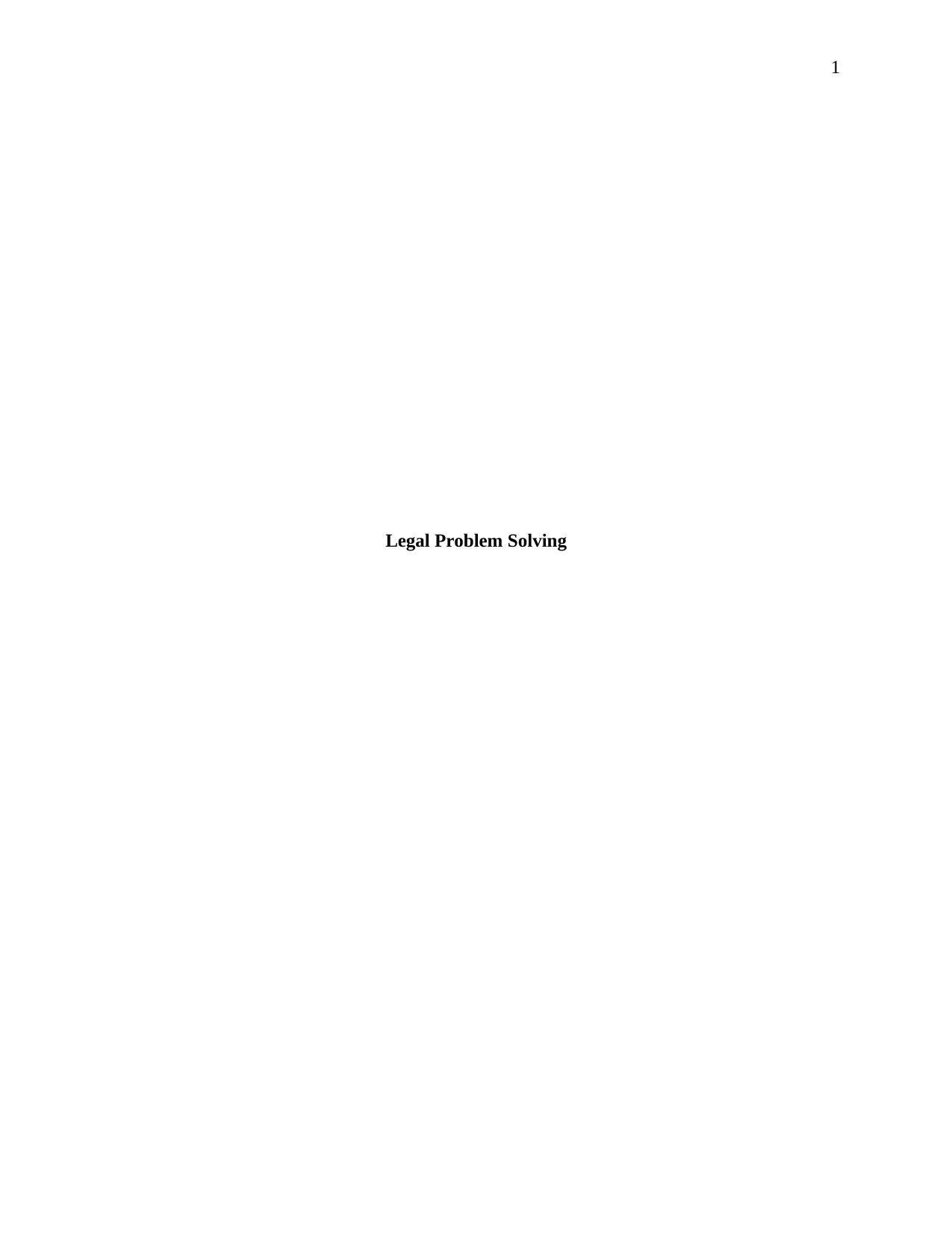
1
Legal Problem Solving
Legal Problem Solving
Secure Best Marks with AI Grader
Need help grading? Try our AI Grader for instant feedback on your assignments.
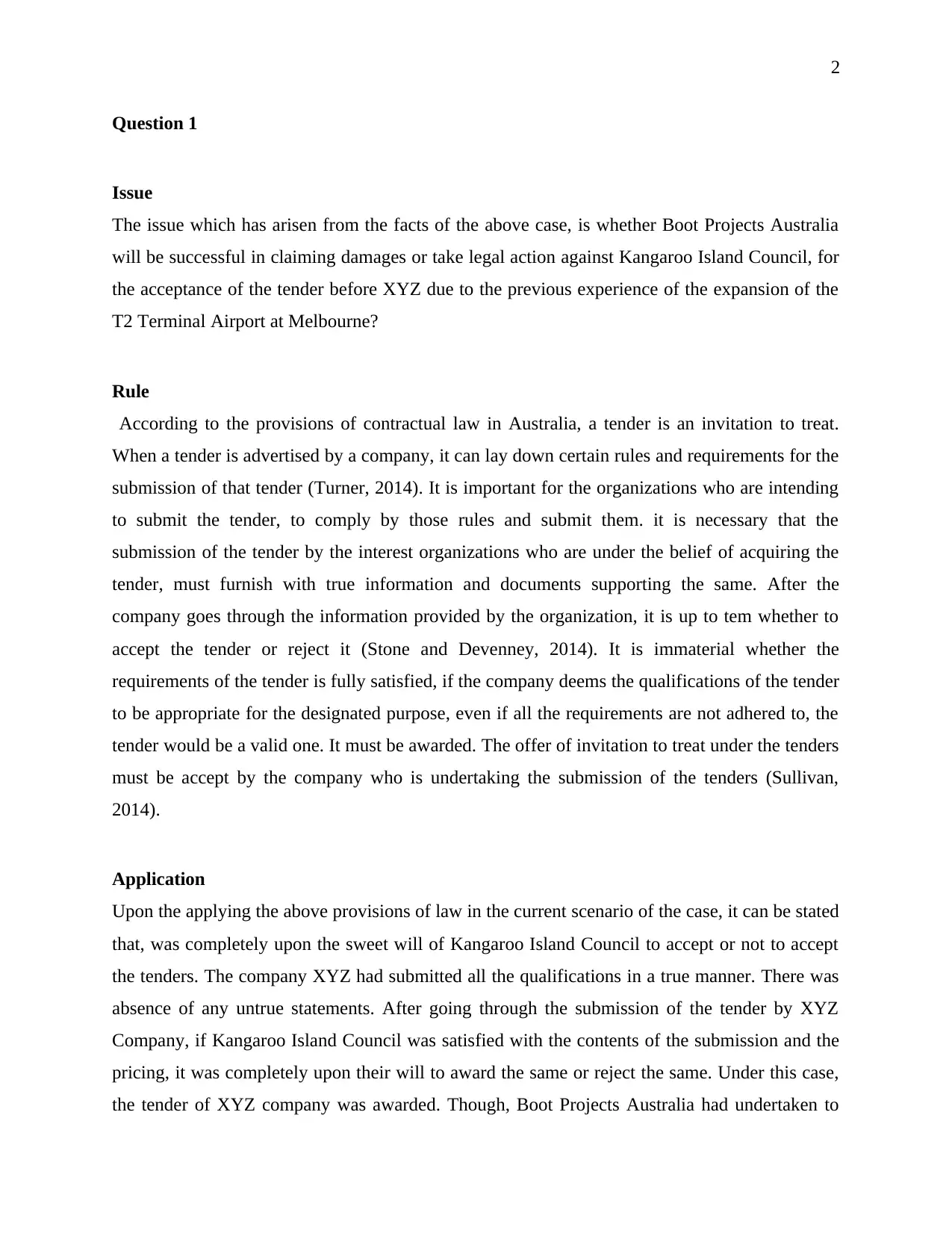
2
Question 1
Issue
The issue which has arisen from the facts of the above case, is whether Boot Projects Australia
will be successful in claiming damages or take legal action against Kangaroo Island Council, for
the acceptance of the tender before XYZ due to the previous experience of the expansion of the
T2 Terminal Airport at Melbourne?
Rule
According to the provisions of contractual law in Australia, a tender is an invitation to treat.
When a tender is advertised by a company, it can lay down certain rules and requirements for the
submission of that tender (Turner, 2014). It is important for the organizations who are intending
to submit the tender, to comply by those rules and submit them. it is necessary that the
submission of the tender by the interest organizations who are under the belief of acquiring the
tender, must furnish with true information and documents supporting the same. After the
company goes through the information provided by the organization, it is up to tem whether to
accept the tender or reject it (Stone and Devenney, 2014). It is immaterial whether the
requirements of the tender is fully satisfied, if the company deems the qualifications of the tender
to be appropriate for the designated purpose, even if all the requirements are not adhered to, the
tender would be a valid one. It must be awarded. The offer of invitation to treat under the tenders
must be accept by the company who is undertaking the submission of the tenders (Sullivan,
2014).
Application
Upon the applying the above provisions of law in the current scenario of the case, it can be stated
that, was completely upon the sweet will of Kangaroo Island Council to accept or not to accept
the tenders. The company XYZ had submitted all the qualifications in a true manner. There was
absence of any untrue statements. After going through the submission of the tender by XYZ
Company, if Kangaroo Island Council was satisfied with the contents of the submission and the
pricing, it was completely upon their will to award the same or reject the same. Under this case,
the tender of XYZ company was awarded. Though, Boot Projects Australia had undertaken to
Question 1
Issue
The issue which has arisen from the facts of the above case, is whether Boot Projects Australia
will be successful in claiming damages or take legal action against Kangaroo Island Council, for
the acceptance of the tender before XYZ due to the previous experience of the expansion of the
T2 Terminal Airport at Melbourne?
Rule
According to the provisions of contractual law in Australia, a tender is an invitation to treat.
When a tender is advertised by a company, it can lay down certain rules and requirements for the
submission of that tender (Turner, 2014). It is important for the organizations who are intending
to submit the tender, to comply by those rules and submit them. it is necessary that the
submission of the tender by the interest organizations who are under the belief of acquiring the
tender, must furnish with true information and documents supporting the same. After the
company goes through the information provided by the organization, it is up to tem whether to
accept the tender or reject it (Stone and Devenney, 2014). It is immaterial whether the
requirements of the tender is fully satisfied, if the company deems the qualifications of the tender
to be appropriate for the designated purpose, even if all the requirements are not adhered to, the
tender would be a valid one. It must be awarded. The offer of invitation to treat under the tenders
must be accept by the company who is undertaking the submission of the tenders (Sullivan,
2014).
Application
Upon the applying the above provisions of law in the current scenario of the case, it can be stated
that, was completely upon the sweet will of Kangaroo Island Council to accept or not to accept
the tenders. The company XYZ had submitted all the qualifications in a true manner. There was
absence of any untrue statements. After going through the submission of the tender by XYZ
Company, if Kangaroo Island Council was satisfied with the contents of the submission and the
pricing, it was completely upon their will to award the same or reject the same. Under this case,
the tender of XYZ company was awarded. Though, Boot Projects Australia had undertaken to
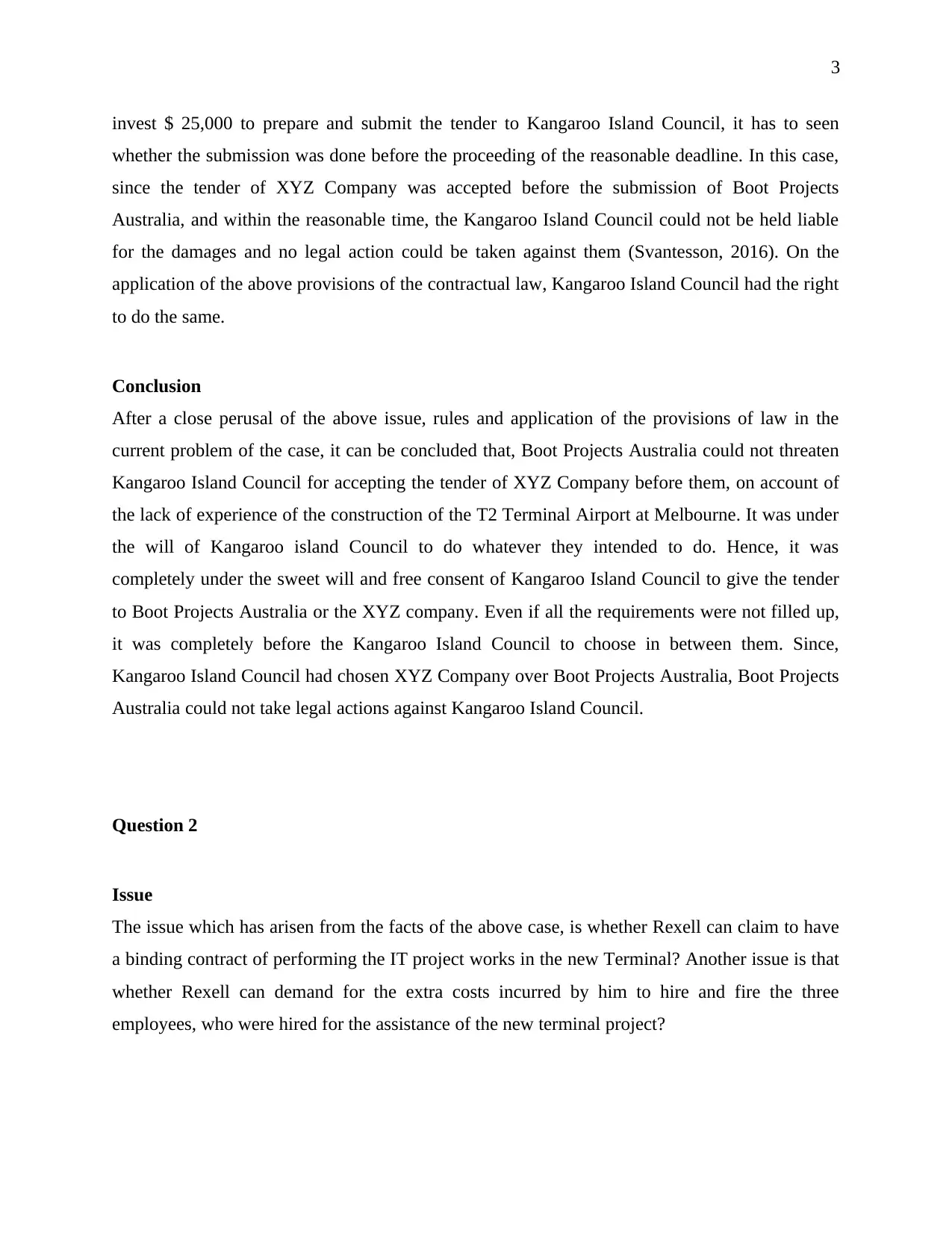
3
invest $ 25,000 to prepare and submit the tender to Kangaroo Island Council, it has to seen
whether the submission was done before the proceeding of the reasonable deadline. In this case,
since the tender of XYZ Company was accepted before the submission of Boot Projects
Australia, and within the reasonable time, the Kangaroo Island Council could not be held liable
for the damages and no legal action could be taken against them (Svantesson, 2016). On the
application of the above provisions of the contractual law, Kangaroo Island Council had the right
to do the same.
Conclusion
After a close perusal of the above issue, rules and application of the provisions of law in the
current problem of the case, it can be concluded that, Boot Projects Australia could not threaten
Kangaroo Island Council for accepting the tender of XYZ Company before them, on account of
the lack of experience of the construction of the T2 Terminal Airport at Melbourne. It was under
the will of Kangaroo island Council to do whatever they intended to do. Hence, it was
completely under the sweet will and free consent of Kangaroo Island Council to give the tender
to Boot Projects Australia or the XYZ company. Even if all the requirements were not filled up,
it was completely before the Kangaroo Island Council to choose in between them. Since,
Kangaroo Island Council had chosen XYZ Company over Boot Projects Australia, Boot Projects
Australia could not take legal actions against Kangaroo Island Council.
Question 2
Issue
The issue which has arisen from the facts of the above case, is whether Rexell can claim to have
a binding contract of performing the IT project works in the new Terminal? Another issue is that
whether Rexell can demand for the extra costs incurred by him to hire and fire the three
employees, who were hired for the assistance of the new terminal project?
invest $ 25,000 to prepare and submit the tender to Kangaroo Island Council, it has to seen
whether the submission was done before the proceeding of the reasonable deadline. In this case,
since the tender of XYZ Company was accepted before the submission of Boot Projects
Australia, and within the reasonable time, the Kangaroo Island Council could not be held liable
for the damages and no legal action could be taken against them (Svantesson, 2016). On the
application of the above provisions of the contractual law, Kangaroo Island Council had the right
to do the same.
Conclusion
After a close perusal of the above issue, rules and application of the provisions of law in the
current problem of the case, it can be concluded that, Boot Projects Australia could not threaten
Kangaroo Island Council for accepting the tender of XYZ Company before them, on account of
the lack of experience of the construction of the T2 Terminal Airport at Melbourne. It was under
the will of Kangaroo island Council to do whatever they intended to do. Hence, it was
completely under the sweet will and free consent of Kangaroo Island Council to give the tender
to Boot Projects Australia or the XYZ company. Even if all the requirements were not filled up,
it was completely before the Kangaroo Island Council to choose in between them. Since,
Kangaroo Island Council had chosen XYZ Company over Boot Projects Australia, Boot Projects
Australia could not take legal actions against Kangaroo Island Council.
Question 2
Issue
The issue which has arisen from the facts of the above case, is whether Rexell can claim to have
a binding contract of performing the IT project works in the new Terminal? Another issue is that
whether Rexell can demand for the extra costs incurred by him to hire and fire the three
employees, who were hired for the assistance of the new terminal project?
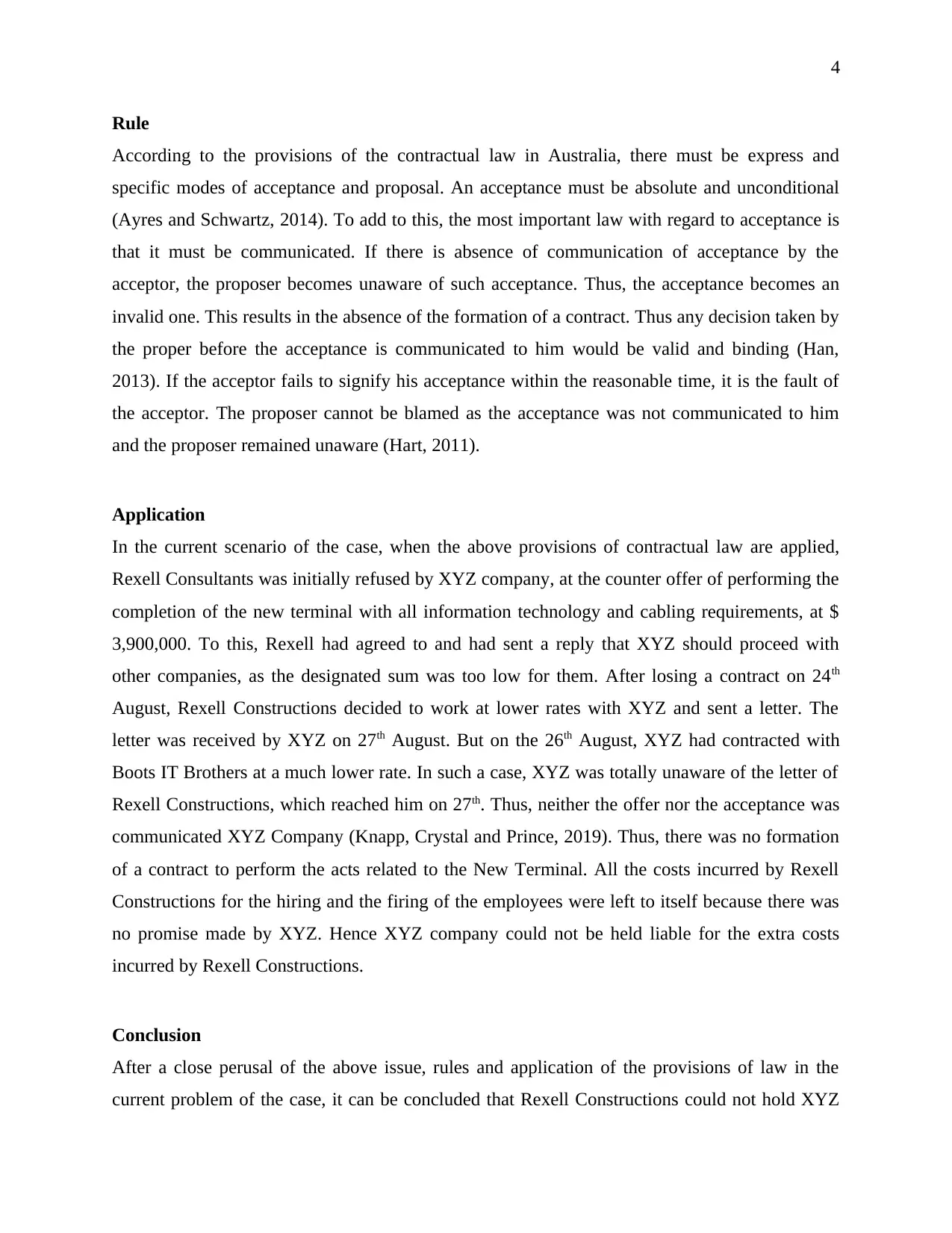
4
Rule
According to the provisions of the contractual law in Australia, there must be express and
specific modes of acceptance and proposal. An acceptance must be absolute and unconditional
(Ayres and Schwartz, 2014). To add to this, the most important law with regard to acceptance is
that it must be communicated. If there is absence of communication of acceptance by the
acceptor, the proposer becomes unaware of such acceptance. Thus, the acceptance becomes an
invalid one. This results in the absence of the formation of a contract. Thus any decision taken by
the proper before the acceptance is communicated to him would be valid and binding (Han,
2013). If the acceptor fails to signify his acceptance within the reasonable time, it is the fault of
the acceptor. The proposer cannot be blamed as the acceptance was not communicated to him
and the proposer remained unaware (Hart, 2011).
Application
In the current scenario of the case, when the above provisions of contractual law are applied,
Rexell Consultants was initially refused by XYZ company, at the counter offer of performing the
completion of the new terminal with all information technology and cabling requirements, at $
3,900,000. To this, Rexell had agreed to and had sent a reply that XYZ should proceed with
other companies, as the designated sum was too low for them. After losing a contract on 24th
August, Rexell Constructions decided to work at lower rates with XYZ and sent a letter. The
letter was received by XYZ on 27th August. But on the 26th August, XYZ had contracted with
Boots IT Brothers at a much lower rate. In such a case, XYZ was totally unaware of the letter of
Rexell Constructions, which reached him on 27th. Thus, neither the offer nor the acceptance was
communicated XYZ Company (Knapp, Crystal and Prince, 2019). Thus, there was no formation
of a contract to perform the acts related to the New Terminal. All the costs incurred by Rexell
Constructions for the hiring and the firing of the employees were left to itself because there was
no promise made by XYZ. Hence XYZ company could not be held liable for the extra costs
incurred by Rexell Constructions.
Conclusion
After a close perusal of the above issue, rules and application of the provisions of law in the
current problem of the case, it can be concluded that Rexell Constructions could not hold XYZ
Rule
According to the provisions of the contractual law in Australia, there must be express and
specific modes of acceptance and proposal. An acceptance must be absolute and unconditional
(Ayres and Schwartz, 2014). To add to this, the most important law with regard to acceptance is
that it must be communicated. If there is absence of communication of acceptance by the
acceptor, the proposer becomes unaware of such acceptance. Thus, the acceptance becomes an
invalid one. This results in the absence of the formation of a contract. Thus any decision taken by
the proper before the acceptance is communicated to him would be valid and binding (Han,
2013). If the acceptor fails to signify his acceptance within the reasonable time, it is the fault of
the acceptor. The proposer cannot be blamed as the acceptance was not communicated to him
and the proposer remained unaware (Hart, 2011).
Application
In the current scenario of the case, when the above provisions of contractual law are applied,
Rexell Consultants was initially refused by XYZ company, at the counter offer of performing the
completion of the new terminal with all information technology and cabling requirements, at $
3,900,000. To this, Rexell had agreed to and had sent a reply that XYZ should proceed with
other companies, as the designated sum was too low for them. After losing a contract on 24th
August, Rexell Constructions decided to work at lower rates with XYZ and sent a letter. The
letter was received by XYZ on 27th August. But on the 26th August, XYZ had contracted with
Boots IT Brothers at a much lower rate. In such a case, XYZ was totally unaware of the letter of
Rexell Constructions, which reached him on 27th. Thus, neither the offer nor the acceptance was
communicated XYZ Company (Knapp, Crystal and Prince, 2019). Thus, there was no formation
of a contract to perform the acts related to the New Terminal. All the costs incurred by Rexell
Constructions for the hiring and the firing of the employees were left to itself because there was
no promise made by XYZ. Hence XYZ company could not be held liable for the extra costs
incurred by Rexell Constructions.
Conclusion
After a close perusal of the above issue, rules and application of the provisions of law in the
current problem of the case, it can be concluded that Rexell Constructions could not hold XYZ
Secure Best Marks with AI Grader
Need help grading? Try our AI Grader for instant feedback on your assignments.
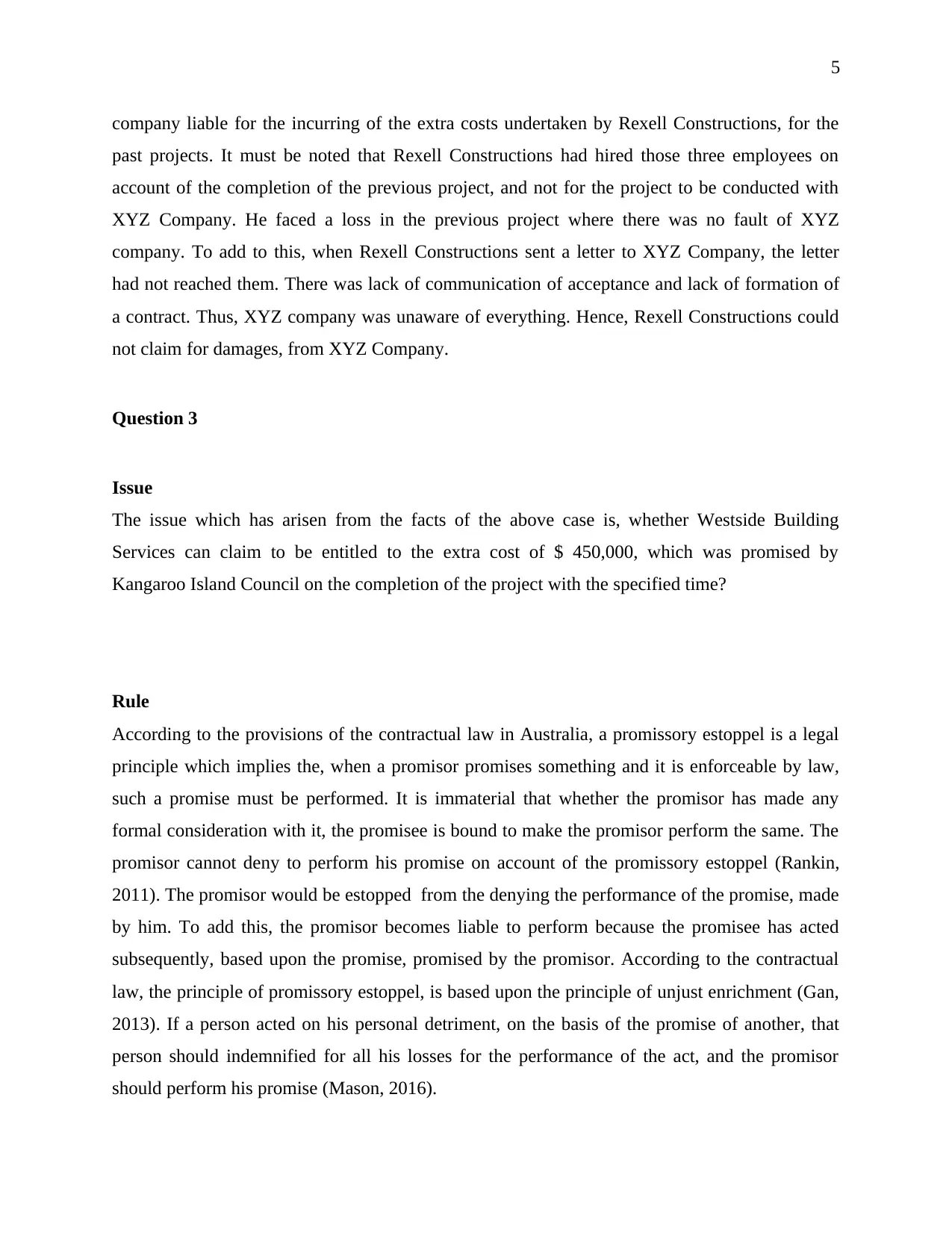
5
company liable for the incurring of the extra costs undertaken by Rexell Constructions, for the
past projects. It must be noted that Rexell Constructions had hired those three employees on
account of the completion of the previous project, and not for the project to be conducted with
XYZ Company. He faced a loss in the previous project where there was no fault of XYZ
company. To add to this, when Rexell Constructions sent a letter to XYZ Company, the letter
had not reached them. There was lack of communication of acceptance and lack of formation of
a contract. Thus, XYZ company was unaware of everything. Hence, Rexell Constructions could
not claim for damages, from XYZ Company.
Question 3
Issue
The issue which has arisen from the facts of the above case is, whether Westside Building
Services can claim to be entitled to the extra cost of $ 450,000, which was promised by
Kangaroo Island Council on the completion of the project with the specified time?
Rule
According to the provisions of the contractual law in Australia, a promissory estoppel is a legal
principle which implies the, when a promisor promises something and it is enforceable by law,
such a promise must be performed. It is immaterial that whether the promisor has made any
formal consideration with it, the promisee is bound to make the promisor perform the same. The
promisor cannot deny to perform his promise on account of the promissory estoppel (Rankin,
2011). The promisor would be estopped from the denying the performance of the promise, made
by him. To add this, the promisor becomes liable to perform because the promisee has acted
subsequently, based upon the promise, promised by the promisor. According to the contractual
law, the principle of promissory estoppel, is based upon the principle of unjust enrichment (Gan,
2013). If a person acted on his personal detriment, on the basis of the promise of another, that
person should indemnified for all his losses for the performance of the act, and the promisor
should perform his promise (Mason, 2016).
company liable for the incurring of the extra costs undertaken by Rexell Constructions, for the
past projects. It must be noted that Rexell Constructions had hired those three employees on
account of the completion of the previous project, and not for the project to be conducted with
XYZ Company. He faced a loss in the previous project where there was no fault of XYZ
company. To add to this, when Rexell Constructions sent a letter to XYZ Company, the letter
had not reached them. There was lack of communication of acceptance and lack of formation of
a contract. Thus, XYZ company was unaware of everything. Hence, Rexell Constructions could
not claim for damages, from XYZ Company.
Question 3
Issue
The issue which has arisen from the facts of the above case is, whether Westside Building
Services can claim to be entitled to the extra cost of $ 450,000, which was promised by
Kangaroo Island Council on the completion of the project with the specified time?
Rule
According to the provisions of the contractual law in Australia, a promissory estoppel is a legal
principle which implies the, when a promisor promises something and it is enforceable by law,
such a promise must be performed. It is immaterial that whether the promisor has made any
formal consideration with it, the promisee is bound to make the promisor perform the same. The
promisor cannot deny to perform his promise on account of the promissory estoppel (Rankin,
2011). The promisor would be estopped from the denying the performance of the promise, made
by him. To add this, the promisor becomes liable to perform because the promisee has acted
subsequently, based upon the promise, promised by the promisor. According to the contractual
law, the principle of promissory estoppel, is based upon the principle of unjust enrichment (Gan,
2013). If a person acted on his personal detriment, on the basis of the promise of another, that
person should indemnified for all his losses for the performance of the act, and the promisor
should perform his promise (Mason, 2016).
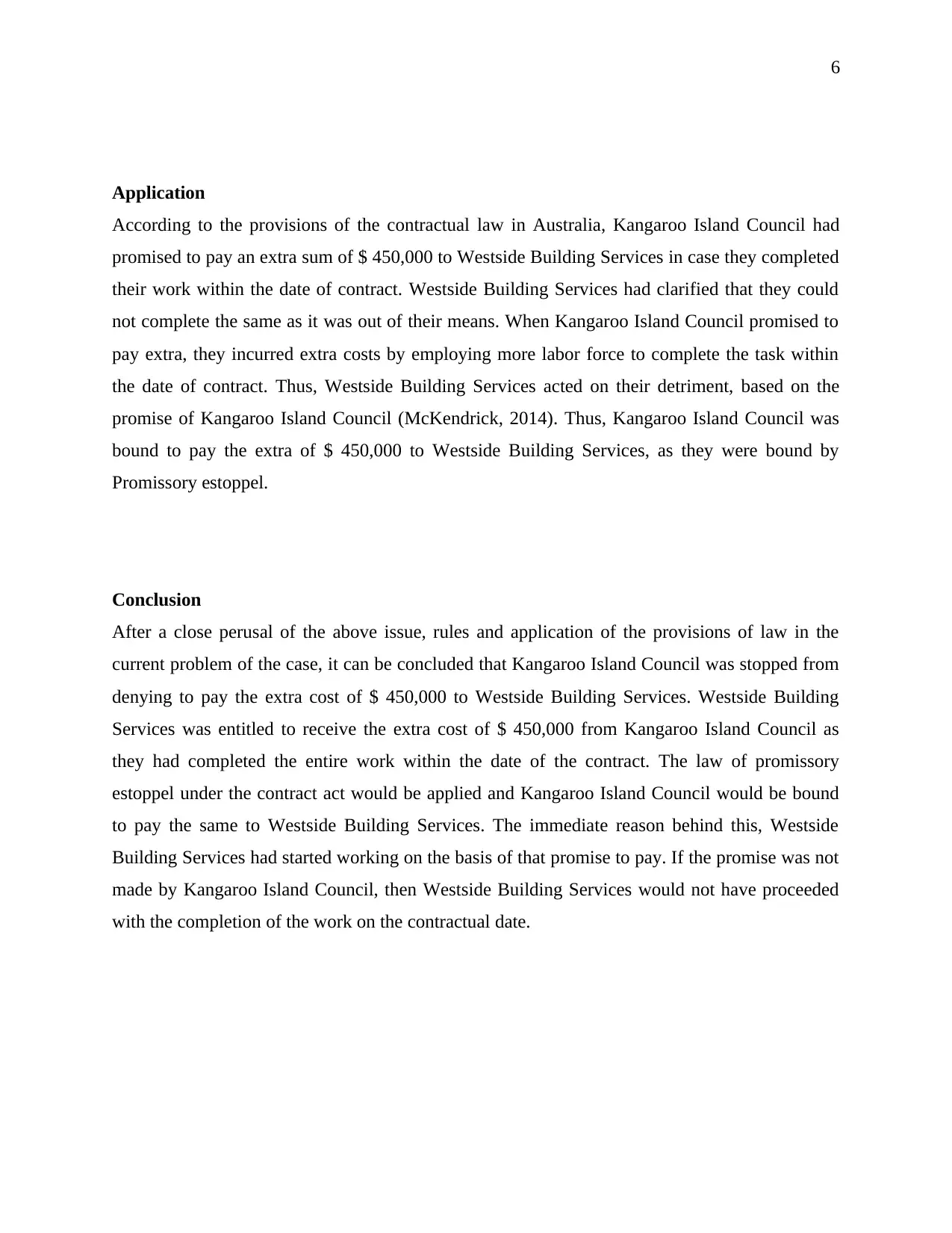
6
Application
According to the provisions of the contractual law in Australia, Kangaroo Island Council had
promised to pay an extra sum of $ 450,000 to Westside Building Services in case they completed
their work within the date of contract. Westside Building Services had clarified that they could
not complete the same as it was out of their means. When Kangaroo Island Council promised to
pay extra, they incurred extra costs by employing more labor force to complete the task within
the date of contract. Thus, Westside Building Services acted on their detriment, based on the
promise of Kangaroo Island Council (McKendrick, 2014). Thus, Kangaroo Island Council was
bound to pay the extra of $ 450,000 to Westside Building Services, as they were bound by
Promissory estoppel.
Conclusion
After a close perusal of the above issue, rules and application of the provisions of law in the
current problem of the case, it can be concluded that Kangaroo Island Council was stopped from
denying to pay the extra cost of $ 450,000 to Westside Building Services. Westside Building
Services was entitled to receive the extra cost of $ 450,000 from Kangaroo Island Council as
they had completed the entire work within the date of the contract. The law of promissory
estoppel under the contract act would be applied and Kangaroo Island Council would be bound
to pay the same to Westside Building Services. The immediate reason behind this, Westside
Building Services had started working on the basis of that promise to pay. If the promise was not
made by Kangaroo Island Council, then Westside Building Services would not have proceeded
with the completion of the work on the contractual date.
Application
According to the provisions of the contractual law in Australia, Kangaroo Island Council had
promised to pay an extra sum of $ 450,000 to Westside Building Services in case they completed
their work within the date of contract. Westside Building Services had clarified that they could
not complete the same as it was out of their means. When Kangaroo Island Council promised to
pay extra, they incurred extra costs by employing more labor force to complete the task within
the date of contract. Thus, Westside Building Services acted on their detriment, based on the
promise of Kangaroo Island Council (McKendrick, 2014). Thus, Kangaroo Island Council was
bound to pay the extra of $ 450,000 to Westside Building Services, as they were bound by
Promissory estoppel.
Conclusion
After a close perusal of the above issue, rules and application of the provisions of law in the
current problem of the case, it can be concluded that Kangaroo Island Council was stopped from
denying to pay the extra cost of $ 450,000 to Westside Building Services. Westside Building
Services was entitled to receive the extra cost of $ 450,000 from Kangaroo Island Council as
they had completed the entire work within the date of the contract. The law of promissory
estoppel under the contract act would be applied and Kangaroo Island Council would be bound
to pay the same to Westside Building Services. The immediate reason behind this, Westside
Building Services had started working on the basis of that promise to pay. If the promise was not
made by Kangaroo Island Council, then Westside Building Services would not have proceeded
with the completion of the work on the contractual date.
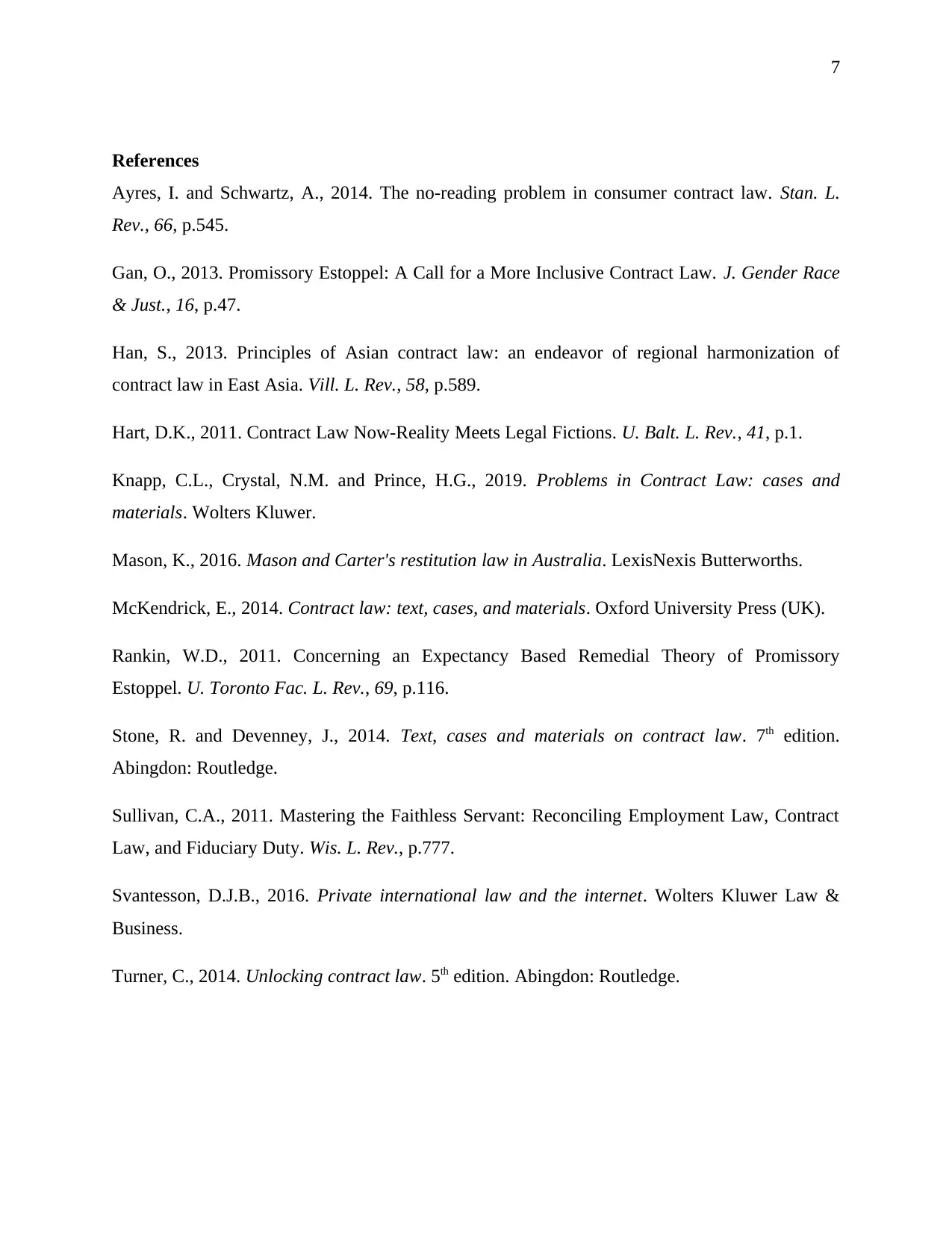
7
References
Ayres, I. and Schwartz, A., 2014. The no-reading problem in consumer contract law. Stan. L.
Rev., 66, p.545.
Gan, O., 2013. Promissory Estoppel: A Call for a More Inclusive Contract Law. J. Gender Race
& Just., 16, p.47.
Han, S., 2013. Principles of Asian contract law: an endeavor of regional harmonization of
contract law in East Asia. Vill. L. Rev., 58, p.589.
Hart, D.K., 2011. Contract Law Now-Reality Meets Legal Fictions. U. Balt. L. Rev., 41, p.1.
Knapp, C.L., Crystal, N.M. and Prince, H.G., 2019. Problems in Contract Law: cases and
materials. Wolters Kluwer.
Mason, K., 2016. Mason and Carter's restitution law in Australia. LexisNexis Butterworths.
McKendrick, E., 2014. Contract law: text, cases, and materials. Oxford University Press (UK).
Rankin, W.D., 2011. Concerning an Expectancy Based Remedial Theory of Promissory
Estoppel. U. Toronto Fac. L. Rev., 69, p.116.
Stone, R. and Devenney, J., 2014. Text, cases and materials on contract law. 7th edition.
Abingdon: Routledge.
Sullivan, C.A., 2011. Mastering the Faithless Servant: Reconciling Employment Law, Contract
Law, and Fiduciary Duty. Wis. L. Rev., p.777.
Svantesson, D.J.B., 2016. Private international law and the internet. Wolters Kluwer Law &
Business.
Turner, C., 2014. Unlocking contract law. 5th edition. Abingdon: Routledge.
References
Ayres, I. and Schwartz, A., 2014. The no-reading problem in consumer contract law. Stan. L.
Rev., 66, p.545.
Gan, O., 2013. Promissory Estoppel: A Call for a More Inclusive Contract Law. J. Gender Race
& Just., 16, p.47.
Han, S., 2013. Principles of Asian contract law: an endeavor of regional harmonization of
contract law in East Asia. Vill. L. Rev., 58, p.589.
Hart, D.K., 2011. Contract Law Now-Reality Meets Legal Fictions. U. Balt. L. Rev., 41, p.1.
Knapp, C.L., Crystal, N.M. and Prince, H.G., 2019. Problems in Contract Law: cases and
materials. Wolters Kluwer.
Mason, K., 2016. Mason and Carter's restitution law in Australia. LexisNexis Butterworths.
McKendrick, E., 2014. Contract law: text, cases, and materials. Oxford University Press (UK).
Rankin, W.D., 2011. Concerning an Expectancy Based Remedial Theory of Promissory
Estoppel. U. Toronto Fac. L. Rev., 69, p.116.
Stone, R. and Devenney, J., 2014. Text, cases and materials on contract law. 7th edition.
Abingdon: Routledge.
Sullivan, C.A., 2011. Mastering the Faithless Servant: Reconciling Employment Law, Contract
Law, and Fiduciary Duty. Wis. L. Rev., p.777.
Svantesson, D.J.B., 2016. Private international law and the internet. Wolters Kluwer Law &
Business.
Turner, C., 2014. Unlocking contract law. 5th edition. Abingdon: Routledge.
1 out of 7
Related Documents
Your All-in-One AI-Powered Toolkit for Academic Success.
+13062052269
info@desklib.com
Available 24*7 on WhatsApp / Email
![[object Object]](/_next/static/media/star-bottom.7253800d.svg)
Unlock your academic potential
© 2024 | Zucol Services PVT LTD | All rights reserved.





